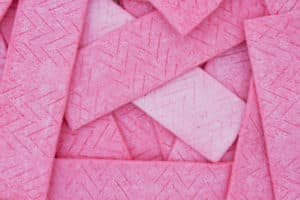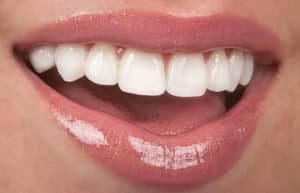Is Chewing Gum Good for the Teeth or No?


Statistic reports show that about 374 trillion sticks of gum are made every year. Many have synthetic materials in them such as resins and waxes, plus edible materials such as sugar and flavor enhancers. Many people think that chewing gum is very similar to candy, and it can be if it’s full of sugar. However, chewing gum can be good for your teeth. Some will even have the American Dental Association’s Seal of Acceptance, which signifies that a product is beneficial for helping patients avoid oral health diseases.
Chewing Gum: How Popular Is It?
Millions of people buy chewing gum each year. Top brands like Trident, Extra, Orbit, Mentos, Eclipse, 5, Stride, Juicy Fruit and Dubble Bubble are ones consumers know and love. How much do people love it? Enough that Trident alone makes about $657.3 million dollars a year on gum sales. That’s only one brand of gum. Orbit and Extra follow closely behind with $551.1 million dollars in sales and $488.7 million.
- Over 374 trillion sticks of gum are made each year.
- On average, a person that chews gum will chew more than 300 pieces of gum each year.
- Some studies show that chewing on gum can help improve your concentration in both visual tasks and auditory memory tasks.
- There is a difference between chewing gum and bubble gum. Bubble gum is a type of chewing gum which is designed to allow chewers the ability to inflate bubbles in the gum. If you struggle with blowing bubbles with your gum, it may only be chewing gum.

Origin of Gum Ingredients
You may be surprised to know that gum isn’t food at all, but plastic. Yes, we said plastic. Merriam Webmaster Dictionary states that your chewing gum is a “sweetened and flavored insoluble plastic material.” It simply has sugars and other materials added to it that you chew out until your gum is stale. The original chewing gum was created in 1848 by John B. Curtis. He was a salesman that made chewing gum out of spruce resin, beeswax and flavorings.
That original chewing gum has evolved quite a bit over the last 150+ years. Most types of gums will be made from synthetic gum-based materials. Some of those bases may be rubber, while others use wax or plastic as their base. Chicle is a natural rubber that is popularly found in chewing gum. This material originally stems from Mesoamerican trees and is harvested just like latex is harvested from trees. When those specific trees are opened up, the chicle can drip out and be collected in small bags. The chicle is then boiled to a specific consistency.
Ingredients In Modern Gum
Your modern chewing gum is made from much more synthetic materials, so much so that it can’t be digested by your body if you swallow it. It will simply go through your digestive system undigested. Some people consider chewing gum to be litter, as it can’t biodegrade once it is made into gum. In the past, more natural materials were used in gum. Now, gum is made commercially on large scales due to how much is sold on a daily and yearly basis.
Your modern stick of chewing gum will likely have a gum base. Sweeteners, softeners and flavorings by individual companies are then added to the gum base. As chicle was used in the past, rubber and plastic are now used in its place. This happened in the 1900s as scientists were able to produce a more cost-effective synthetic gum base. Your softeners in gum will be vegetable oil or glycerin to soften the synthetic base. Without them, your gum would dry up quickly and would be gross.
Sweeteners may vary between gums depending on the manufacturer. Most will consist of sugar, corn syrup, cornstarch and beet juice among non-calorie sweeteners. The flavors and dyes will all be based off of the specific company’s manufacturing. If you check your gum label, you can see which ingredients are sweeteners if they have “itol” added on the end of a word. Some examples include sorbitol, xylitol, aspartame and mannitol.

Modern Chewing Gum
Chewing gum can have ingredients in it such as beeswax, honey, powdered sugar, gum pellets and more. Some ingredients you will recognize, while others you won’t. Ingredients that won’t be good for your teeth or health include:
- Aspartame. This is an artificial sweetener added to most gums. It is fine to sweeten the palate, but studies show it turns into wood alcohol in your body and formaldehyde. One is a poison, while the other is a carcinogen.
- Butylated Hydroxytoluene (BHT): This is a common preservative in many foods and products such as gum. It is actually banned in many places around the world except for the U.S. this ingredient is linked to health problems such as hyperactivity, toxicity in your organs, liver and kidney damage and more. The more you consume, the higher your risk for problems.
- Calcium Phosphate: This ingredient isn’t bad in everything, but it can be linked to poison if it is created or used the wrong way.
Is Chewing Gum Good for the Teeth?
Chewing gum can be good for your teeth, but it depends on the ingredients. Every gum brand is different, so you must check the labels and make an informed decision. Natural flavorings and sweeteners will always be healthier than synthetic alternatives. Sugar gums can definitely lead to plaque production and tooth decay. Look for the ADA Seal of Acceptance to choose a good brand that can help you avoid cavities.
If you have issues with cavities already, definitely switch to a healthy sugar-free gum. Chewing on gum will never take the place of brushing or flossing your teeth. If you ever have a doubt with you gum, skip all the sugar options and then call our office to find out if your gum is safe for your teeth or not. You can do that by calling Dr. Ania’s office at 303-443-0998!


